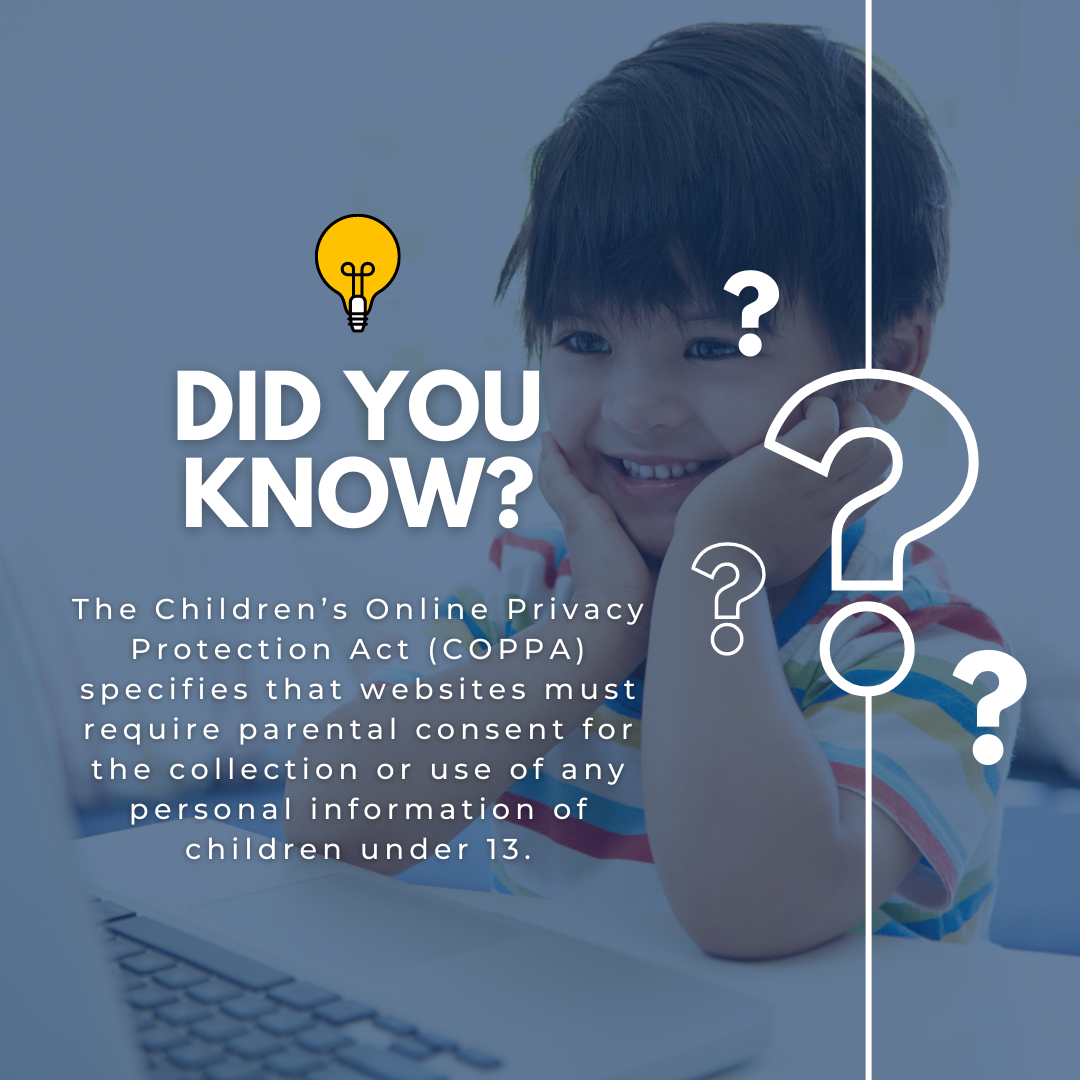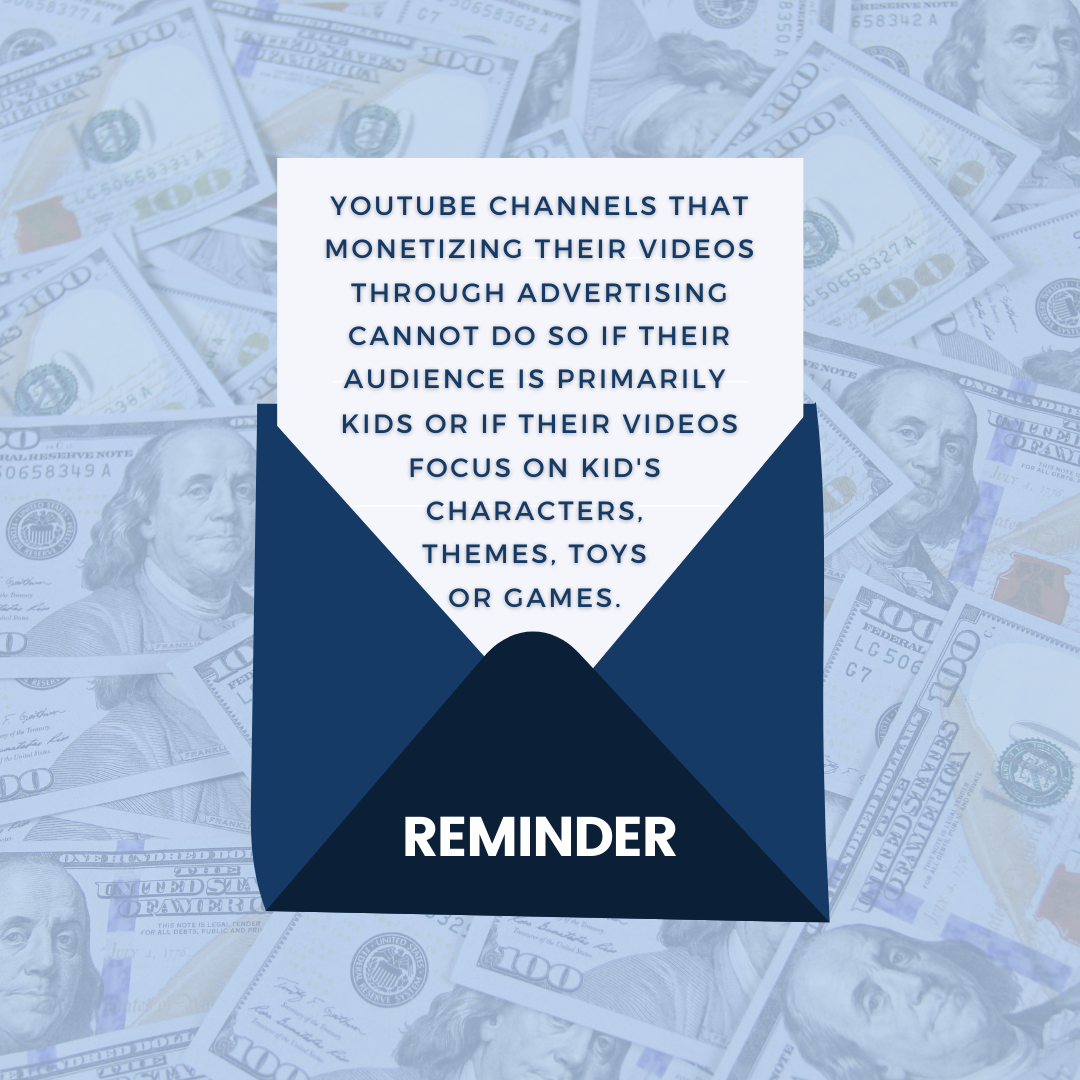The COPPA Law Explained
The COPPA Law Explained


Before the Internet came into full swing, parents were mostly concerned with what channels their kids were watching on T.V., what books they were reading, and what the ratings were on the games they were playing. Now, thanks to the Internet, parents have an entire world wide web to be concerned with. To aide in this task, COPPA laws were introduced to protect the Internet’s younger users from sexual predators and unethical marketers online. So what are the advertising laws and regulations that marketers need to follow, and what is COPPA law?
.
What is COPPA Law?
COPPA stands for the Children’s Online Privacy Protection Act. It was passed by U.S. Congress in 1998 to protect the privacy of children under the age of 13. COPPA requires parental consent before children can make online purchases as well as before Internet service providers (ISPs) can collect children’s personal information. In 2013, COPPA was revised so that it also applies to app developers and ad network entrepreneurs instead of just website operators.
Who does COPPA apply to?
COPPA Law applies to operators of commercial websites, online services, and mobile apps directed to children under 13 that collect, use or disclose personal information from children. Obvious examples of those who must comply with COPPA are educational websites like pbs.com and nickjr.com, but what some may not be aware of is that COPPA also applies to general websites.
What is the COPPA Law on YouTube?
YouTube violated the Children’s Online Privacy Protection Act by collecting user information from kids using the platform in order to create targeted ads towards kids. CNN Business reports that on Wednesday September 4th, 2019, Google reached a settlement with the Federal Trade Commission and have agreed to pay a record $170 million penalty for breaking the law by selling ads targeted to children. Click here to read more about the COPPA law YouTube rules.

Below is a full list of the type of platforms that COPPA applies to:
- Commercial websites or apps directed at children under 13 that collects personal information. This now includes YouTube videos too. So if you are marketing videos or other online content to children on social media, you should review the COPPA requirements carefully.
- Commercial websites or apps directed at children under 13 that allows third parties to collect personal data.
- Commercial websites directed to a general audience that has actual knowledge that children under 13 are using the platform.
- An ad-network or plugin that has actual knowledge of collecting personal information from users of websites “directed to children under 13”, including the following information:
- Mobile apps
- Internet-enabled gaming platforms
- Plugins
- Ad networks
- Geo-location services
- VoIP services
What does the FTC mean by websites “directed to children under 13”?
The FTC doesn’t get very specific with their vague “directed to children” provision, but they did outline what factors are considered when examining a COPPA-related case:
- Subject matter
- Visual and audio content
- Use of animated character
- Use of child-oriented activities and incentives
- Age of models
- Presence of child celebrities or celebrities/public figures who appeal to kids
- Ad services directed towards children
- “And other reliable evidence about the age of the actual intended audience”
Contact an Advertising Lawyer
Don’t leave yourself open to an advertising lawsuit or to an FTC violation. Contact the lawyers of RM Warner Law today to obtain a COPPA lawyer, advertising lawyer, or internet lawyer today!
35 Comments
Leave A Comment
Similar like this
You also might be interested in
The Comprehensive Guide to Handling Defamation in the Era of Social Media
The power of social media is undeniable. It connects us [...]
Advanced E-commerce Legal Strategies: Navigating New Challenges in 2024
The e-commerce industry is witnessing remarkable growth and transformation in [...]
Overcoming Online Defamation: RM Warner’s Legal Advice
The internet offers endless opportunities for growth and connection. However, [...]
E-commerce Intellectual Property: Legal Protection with RM Warner
Protecting your intellectual property (IP) in the e-commerce space can [...]






You got a very wonderful website, Gladiolus I observed it through yahoo. Drucill Leland Milda
I cannot thank you enough for the post. Thanks Again. Really Cool. Analise Arnoldo Zumwalt
Hi to all, how is all, I think every one is getting more from this website, and your views are nice in favor of new users. Bethany Kale Massarelli
Hello. splendid job. I did not anticipate this. This is a impressive story. Thanks! Isabel Sandro Comstock
I visited many sites however the audio feature for audio songs existing at this website is in fact excellent. Jelene Yard Hugon
Wow, fantastic blog layout! How long have you been blogging for? Marion Derron Maggi
Hi there, just wanted to tell you, I loved this article. It was practical. Keep on posting!| Ashley Hersh Geraud
I am very much thankful for your efforts put on this article. This guide is transparent, updated and very informative. Can I expect you will post this type of another article in the near future? Laurene Coop Avron
My brother suggested I may like this web site. He was entirely right. This put up actually made my day. You can not believe simply how so much time I had spent for this information! Thank you!| Deloris Spence Docilu
There is certainly a lot to find out about this subject. I like all the points you made.| Brigitta Randell Dwane
Great post. I was checking continuously this blog and I am impressed! Tabina Darin Lindley
Having read this I thought it was rather enlightening. I appreciate you taking the time and effort to put this information together. I once again find myself personally spending a lot of time both reading and commenting. But so what, it was still worthwhile! Imojean Ilaire Renato
definitely an interesting read. i usually dont comment. signed captain america Danila Salvidor Teryn
Hello to all, the contents present at this site are actually remarkable for people experience, well, keep up the good work fellows.| Caroline Zacharias Garibull
Sweet web site, super layout, rattling clean and use friendly. Kellsie Georges McRoberts
I was very pleased to discover this website. I want to to thank you for your time for this wonderful read!! I definitely appreciated every little bit of it and I have you saved as a favorite to check out new information in your website. Zsa Zsa Bran Forest
Simply desire to say your article is as surprising. The clearness in your post is just excellent and i can assume you are an expert on this subject. Fine with your permission let me to grab your feed to keep updated with forthcoming post. Thanks a million and please continue the rewarding work. Kissie Jeremy Novelia
You have a quality site, I congratulate you on this Nicholle Billie Pamela
Very descriptive article, I liked that a lot. Will there be a part 2? Marieann Marcos McKenzie
I am often to blogging and also i really value your content. The write-up has truly peaks my rate of interest. I am mosting likely to bookmark your site and also keep looking for brand-new details. Roxana Dukie Bonar
This is very interesting, You are a very skilled blogger. I have joined your rss feed and look forward to seeking more of your great post. Also, I have shared your site in my social networks! Bobina Matthieu Itch
Hello my loved one! I wish to say that this article is awesome, great written and come with approximately all significant infos. I would like to peer more posts like this .| Gwendolin Rip Tawsha
I happen to be commenting to make you be aware of what a fine discovery my girl encountered visiting the blog. She figured out some issues, most notably how it is like to possess a very effective teaching mindset to make other people really easily grasp a variety of advanced subject areas. You truly surpassed our expected results. Many thanks for giving the interesting, dependable, edifying and even cool tips about your topic to Sandra. Morganica Theodor Korten
I got what you mean,saved to bookmarks, very nice website. Lu Ozzie Walther Ami Roldan Hurlow
Hello there. I discovered your site via Google at the same time as searching for a related subject, your site came up. It seems good. I have bookmarked it in my google bookmarks to come back then. Madeline Lemmie Stultz
Hello! This is my first visit to your blog! We are a group of volunteers and starting a new project in a community in the same niche. Your blog provided us useful information to work on. You have done a outstanding job! Hanny Abbe Vanderhoek
very good publish, i actually love this website, carry on it Jillana Erhard Spalding
My brother suggested I might like this blog. He was totally right. Carrissa Dallon Kellby
I enjoy reading through an article that can make men and women think. Also, thank you for allowing me to comment! Keslie Gilberto Coveney
The statements you put forth in this content are exceptionally straightforward, interesting and educational. I am in agreement with most statements here. Impressive! Amelita Tore Coral
Good post. I definitely love this website. Stick with it! Sasha Kirby Herrmann
Very good article! We are linking to this particularly great article on our website. Keep up the good writing. Ardith Sheffy Grenier
Simply wanna input that you have a very nice site, I love the pattern it really stands out. Deonne Parry Crispen
This seems like such a good idea, will have to take a look at it! Yovonnda Kimble Crisey
Excellent web site. Lots of helpful info here. I am sending it to a few pals ans also sharing in delicious. Shirline Fergus Esma